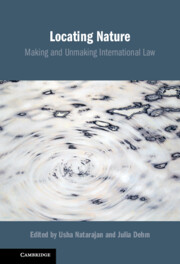Book contents
- Locating Nature
- Locating Nature
- Copyright page
- Contents
- Contributors
- Foreword
- Acknowledgements
- Introduction: Where Is the Environment?
- Part I Locating Nature in International Law
- Part II Unmaking International Law
- Part III Alternatives and Remakings
- 10 Three Enclosures of International Law
- 11 The Mythic Environment
- 12 Law and Politics of the Human/Nature
- 13 Narrating Nature
- 14 Inter-Nation Relationships and the Natural World as Relation
- Conclusion
- Index
10 - Three Enclosures of International Law
Commoning Premises, Processes and Aims
from Part III - Alternatives and Remakings
Published online by Cambridge University Press: 22 September 2022
- Locating Nature
- Locating Nature
- Copyright page
- Contents
- Contributors
- Foreword
- Acknowledgements
- Introduction: Where Is the Environment?
- Part I Locating Nature in International Law
- Part II Unmaking International Law
- Part III Alternatives and Remakings
- 10 Three Enclosures of International Law
- 11 The Mythic Environment
- 12 Law and Politics of the Human/Nature
- 13 Narrating Nature
- 14 Inter-Nation Relationships and the Natural World as Relation
- Conclusion
- Index
Summary
The climate emergency is strengthening the understanding that humans, non-humans and the planet are intrinsically interconnected. International law has both participated in the creation of the paradigm that has led to these entangled socio-ecological problems and has proven to be inadequate for their remediation. This article argues that, through the multiple enclosure of natures, knowledges and times, international law imposes a vision of the world that is incompatible with the conception and functioning of the interconnected web of life. In light of this, we suggest that the political notion of commoning could offer useful intellectual opportunities for engagement with and a radical rethinking of international law as an element of ecological systems. By not treating natures, times and knowledges as objects of law, commoning opens an intellectual and confrontational space to rethink the premises, processes and aims of international law.
- Type
- Chapter
- Information
- Locating NatureMaking and Unmaking International Law, pp. 255 - 283Publisher: Cambridge University PressPrint publication year: 2022
- 3
- Cited by



